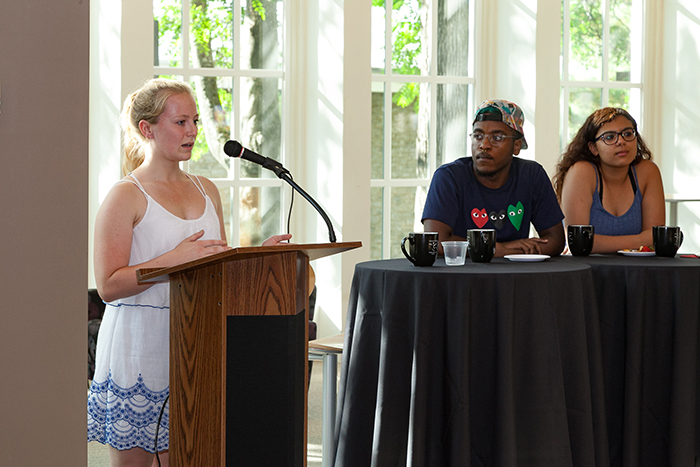The World Is Our Classroom

From left: Meredith Johnson '18, Muhajir Lesure ’20 and Carol Fadalla '18 discuss their summer research during the first "Tea" event of the semester. Photo by Carl Socolow '77,
Student research crosses boundaries to make an impact
by MaryAlice Bitts-Jackson
What do mental health in India, insect neuroplasticity and environmental justice have in common? In a word, Dickinson. In more than a word, they represent the wide range of boundary-crossing summer research students regularly take on.
This summer, Carol Fadalla ’18 (psychology) worked in India with the Comprehensive Rural Health Project; Meredith Johnson ’18 (neuroscience, biochemistry & molecular biology) studied bees and neuroplasticity at the University of Puerto Rico, San Juan; and Muhajir Lesure ’20 (environmental studies, philosophy) probed social justice and sustainability through the Doris Duke Conservation Scholars Program, in Ann Arbor, Michigan. These three students recently gathered in the Waidner-Spahr Library to present their work to the campus community and highlight the ways their cross-cultural research and internships made a positive impact well beyond Dickinson.
Beyond non-Western mental health care
Fadalla's summer internship with the Comprehensive Rural Health Project arose from service work she'd completed with that organization while studying abroad in India through Dickinson's study abroad partner program in New Delhi. After completing a curriculum to educate Indian villagers about diabetes, she asked to stay on with the global nonprofit to embark on original healthcare-related research.
Her question: In a village where there are no skilled mental health professionals and no Western-style mental healthcare delivery systems or psychotropic drugs, can a community-based health care model—in which villagers, trained in basic counseling techniques, provide support to fellow community members and mental health programs provide jobs and social support for the mentally ill—effectively treat mental illness? Her work involved developing and conducting interviews with mental health patients with comorbid conditions, such as leprosy patients who also have AIDS, using an interpreter to bridge the linguistic divide.
“I had to word my questions very carefully,” Fadalla said, noting, for example, that it is considered taboo to ask outright if one suffered from a mental illness; the culturally correct term is “tension.” At the end of the summerlong work, she found evidence to support the idea that basic therapeutic techniques, coupled with a job and family and financial support, significantly improved self-reported mental health outcomes.
Bees and neuroplasticity
Johnson’s summer research in Puerto Rico stemmed from contacts she'd made the summer before, conducting National Science Foundation-funded fieldwork on native bees in Greece and Turkey through the University of Central Oklahoma at Edmond. (At that time, she was part of a team studying interactions between the rotating rhythms of a particular bee species and the circadian rhythms of the morning glory flower, and she's since co-published the findings and has co-presented at a professional conference.)
“After I came back to Dickinson, I knew I wanted to continue studying insects,” she said. So when she learned about an opportunity to study neuroplasticity in bees in France this past summer, she made sure to apply.
In France, Johnson says she worked in the field for about 60 hours a week, collecting samples and studying the protein interactions in bees’ brains that influence the insects’ behavior, "and it was more than worth the work to get the results." She is continuing to study neuroplasticity for her honors thesis project and is investigating graduate programs.
Environmentalism and social justice
Lesure discussed his experiences as a Doris Duke Conservation scholar, working on an environmental justice program as an intern at the University of Michigan’s Center for Sustainable Systems. In that role, he researched and created fact sheets to help educate the public about sustainability justice, including issues facing undocumented farm workers.
“I think a lot of the issues we see in the world today come down to education, and the fact that we don’t know how to properly frame these issues," he said. "Just the fact that there’s a debate over whether climate change is real is problematic."
Lesure also described his Dana research assistantship on Indian energy systems with Assistant Professor of Environmental Studies Heather Bedi and shared plans to study migration, sustainability and gender next summer in China and conduct environmental service work in communities in need, such as Flint, Michigan.
Looking ahead
Asked for advice he'd give students who’ve not yet had an internship, Lesure advised them to start looking for opportunities early on and to ask their advisors for advice. Johnson and Fadalla agreed. “And take advantage of all of the networking events Dickinson’s Career Center has to offer,” Fadalla said.
“Applying to a broad range of opportunities is important,” Johnson added. “It’s hard to know exactly what you are interested in until you try it.”
The student presentations were part of the college's FaculTea series, which brings Dickinsonians together in the Waidner-Spahr Library’s Biblio Café to learn about faculty and student research. Upcoming FaculTea events will feature Assistant Professor of Sociology Eric Love discussing Islamophobia (Oct. 11) and Professor of Creative Writing Susan Perabo discussing writing (Nov. 8).
TAKE THE NEXT STEPS
Published October 3, 2017